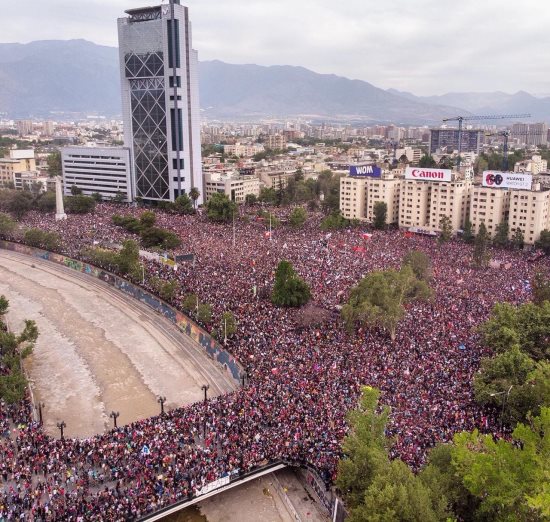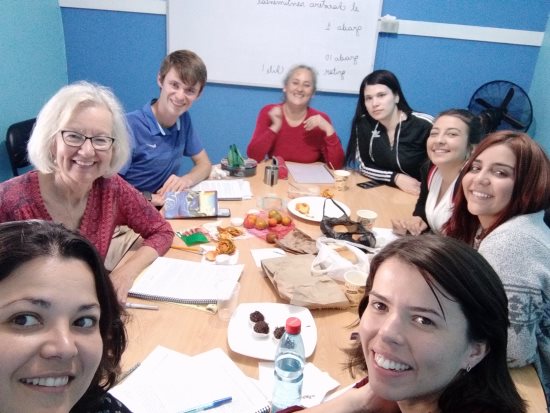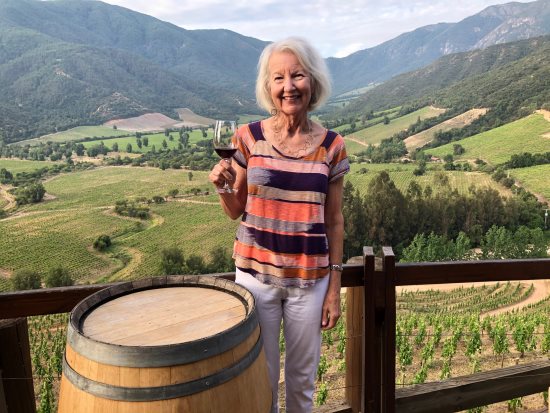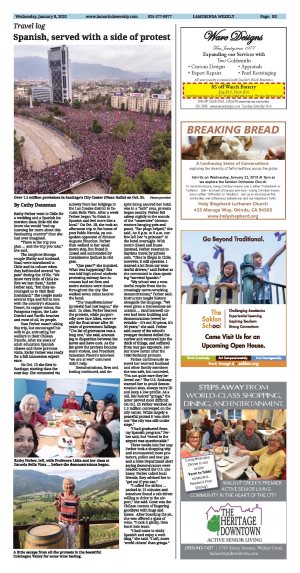| | Published January 8th, 2020
| Travel log
| | Spanish, served with a side of protest | | By Cathy Dausman |  | | Over 1.5 million protestors in Santiago's City Center (Plaza Italia) on Oct. 25. Photos provided |
Kathy Ferber went to Chile for a wedding and a Spanish immersion class; little did she know she would "end up learning far more about this fascinating country" than she had ever imagined.
 "There is the trip you plan . and the trip you take," she said.
"There is the trip you plan . and the trip you take," she said.
 The longtime Moraga couple (Kathy and husband, Stan) were introduced to Chile and its culture when they befriended several "expats" during the 1970s. "We knew very little of Chile before we met them," Kathy Ferber said, "but they encouraged us to visit their homeland." The couple made several trips and fell in love with the country's Atacama Desert, its copper mines, the Patagonia region, the Lake District and Pacific beaches and most of all, its people.
The longtime Moraga couple (Kathy and husband, Stan) were introduced to Chile and its culture when they befriended several "expats" during the 1970s. "We knew very little of Chile before we met them," Kathy Ferber said, "but they encouraged us to visit their homeland." The couple made several trips and fell in love with the country's Atacama Desert, its copper mines, the Patagonia region, the Lake District and Pacific beaches and most of all, its people.
 Stan Ferber wasn't taking this trip, but encouraged his wife to go, entrusting her welfare to their Chilean friends. After six years of adult education Spanish classes and three previous visits, Kathy Ferber was ready for a full immersion experience.
Stan Ferber wasn't taking this trip, but encouraged his wife to go, entrusting her welfare to their Chilean friends. After six years of adult education Spanish classes and three previous visits, Kathy Ferber was ready for a full immersion experience.
 On Oct. 13 she flew to Santiago; starting class the next day. She commuted via subway from her lodgings in the Las Condes district to Escuela Bella Vista. After a week Ferber began "to think in Spanish and feel more like a local." On Oct. 18, she took an afternoon trip to the home of poet Pablo Neruda, an outspoken opponent of dictator Augusto Pinochet. Ferber then walked to her usual metro stop, but found it closed and surrounded by Carabineros (police) in riot gear.
On Oct. 13 she flew to Santiago; starting class the next day. She commuted via subway from her lodgings in the Las Condes district to Escuela Bella Vista. After a week Ferber began "to think in Spanish and feel more like a local." On Oct. 18, she took an afternoon trip to the home of poet Pablo Neruda, an outspoken opponent of dictator Augusto Pinochet. Ferber then walked to her usual metro stop, but found it closed and surrounded by Carabineros (police) in riot gear.
 "Que paso?" she inquired. What was happening? She was told high school students protesting subway fare increases had set fires and metro stations were closed throughout the city. She walked seven miles back to the hotel.
"Que paso?" she inquired. What was happening? She was told high school students protesting subway fare increases had set fires and metro stations were closed throughout the city. She walked seven miles back to the hotel.
 "The `manifestaciones' (protests) had just begun," she said. In class, Ferber learned the protests, while purportedly over fare hikes, were really the final straw after 30 years of government failings. "The list of grievances was a long one," she said, amounting to disparities between the haves and have-nots. As the list grew the protests became more violent, and President Sebastian Pinera's televised "we are at war" comment didn't help.
"The `manifestaciones' (protests) had just begun," she said. In class, Ferber learned the protests, while purportedly over fare hikes, were really the final straw after 30 years of government failings. "The list of grievances was a long one," she said, amounting to disparities between the haves and have-nots. As the list grew the protests became more violent, and President Sebastian Pinera's televised "we are at war" comment didn't help.
 Demonstrations, fires and looting continued, and despite being assured her hotel was in a "safe" area, protests began nearby. Ferber fell asleep nightly to the sounds of the "casseroles" (demonstrators banging pots and pans). "Ear plugs helped," she said. An 8 p.m. to 6 a.m. curfew left her "a prisoner" in the hotel overnight. With metro closed and buses jammed, Ferber resorted to daytime travel by private auto. "Uber is illegal in Chile, however, it still operates. I learned a lot from my wonderful drivers," said Ferber as she commuted to class speaking "survival Spanish."
Demonstrations, fires and looting continued, and despite being assured her hotel was in a "safe" area, protests began nearby. Ferber fell asleep nightly to the sounds of the "casseroles" (demonstrators banging pots and pans). "Ear plugs helped," she said. An 8 p.m. to 6 a.m. curfew left her "a prisoner" in the hotel overnight. With metro closed and buses jammed, Ferber resorted to daytime travel by private auto. "Uber is illegal in Chile, however, it still operates. I learned a lot from my wonderful drivers," said Ferber as she commuted to class speaking "survival Spanish."
 "My school was a wonderful respite from the increasingly nerve-wracking demonstrations," Ferber said. Instructors taught history alongside the language. "We were given a tremendous education . (and learned) unrest had been building and demonstrations (were) inevitable - it's not 30 pesos, it's 30 years," she said. Ferber said many of the school's younger students defied the curfew and ventured into the thick of things, and suffered from tear gas exposure. Ferber knew better after the 1960 Berkeley protests.
"My school was a wonderful respite from the increasingly nerve-wracking demonstrations," Ferber said. Instructors taught history alongside the language. "We were given a tremendous education . (and learned) unrest had been building and demonstrations (were) inevitable - it's not 30 pesos, it's 30 years," she said. Ferber said many of the school's younger students defied the curfew and ventured into the thick of things, and suffered from tear gas exposure. Ferber knew better after the 1960 Berkeley protests.
 Ferber continuously assured her worried husband and other family members she was safe, but conceded, "I'm not quite sure they believed me." The U.S. Embassy warned her to avoid demonstration sites, always carry ID and keep a low profile. As a tall, fair-haired "gringa," the latter proved most difficult. On Oct. 25 Ferber watched as 1.5 million converged on the city center. While largely a peaceful protest it was obvious "the city was still under siege."
Ferber continuously assured her worried husband and other family members she was safe, but conceded, "I'm not quite sure they believed me." The U.S. Embassy warned her to avoid demonstration sites, always carry ID and keep a low profile. As a tall, fair-haired "gringa," the latter proved most difficult. On Oct. 25 Ferber watched as 1.5 million converged on the city center. While largely a peaceful protest it was obvious "the city was still under siege."
 "I had graduated from my Spanish program," Ferber said, but "travel to the airport was questionable."
"I had graduated from my Spanish program," Ferber said, but "travel to the airport was questionable."
 Three weeks into her stay Ferber took a shopping trip and encountered more protestors, police and tear gas and a State Department alert saying demonstrators were headed toward the U.S. Embassy. Ferber called local friends; they advised her to "get out if you can."
Three weeks into her stay Ferber took a shopping trip and encountered more protestors, police and tear gas and a State Department alert saying demonstrators were headed toward the U.S. Embassy. Ferber called local friends; they advised her to "get out if you can."
 "I called the airline . packed in 15 minutes and somehow found a cab driver willing to drive to the airport," she said. Gone was the Chilean custom of lingering goodbyes with hugs and kisses. After boarding the jet, she was offered a glass of wine. "I took it gladly, then burst into tears.
"I called the airline . packed in 15 minutes and somehow found a cab driver willing to drive to the airport," she said. Gone was the Chilean custom of lingering goodbyes with hugs and kisses. After boarding the jet, she was offered a glass of wine. "I took it gladly, then burst into tears.
 "I had come to study Spanish and enjoy a wedding," she said. "I left, more `world citizen' than gringa."
"I had come to study Spanish and enjoy a wedding," she said. "I left, more `world citizen' than gringa." |
 | | Kathy Ferber, left, with Profesora Lidia and her class at Escuela Bella Vista ... before the demonstrations began. |  | | A little escape from all the protests in the beautiful Colchagua Valley for some wine tasting. | | | | | | | | | |





